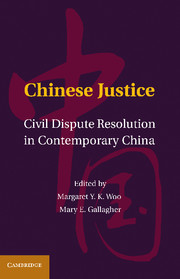Book contents
- Frontmatter
- Contents
- Tables and Figures
- Contributors
- Acknowledgments
- Abbreviations
- Glossary
- Introduction
- PART I LEGAL DEVELOPMENT AND INSTITUTIONAL TENSIONS
- PART II PU FA AND THE DISSEMINATION OF LAW IN THE CHINESE CONTEXT
- PART III LAW FROM THE BOTTOM UP
- 9 A Populist Threat to China's Courts?
- 10 Dispute Resolution and China's Grassroots Legal Services
- 11 The Constitution in the Courtroom: Constitutional Development and Civil Litigation in China
- Conclusion: Chinese Justice from the Bottom Up
- Index
- References
11 - The Constitution in the Courtroom: Constitutional Development and Civil Litigation in China
Published online by Cambridge University Press: 05 July 2011
- Frontmatter
- Contents
- Tables and Figures
- Contributors
- Acknowledgments
- Abbreviations
- Glossary
- Introduction
- PART I LEGAL DEVELOPMENT AND INSTITUTIONAL TENSIONS
- PART II PU FA AND THE DISSEMINATION OF LAW IN THE CHINESE CONTEXT
- PART III LAW FROM THE BOTTOM UP
- 9 A Populist Threat to China's Courts?
- 10 Dispute Resolution and China's Grassroots Legal Services
- 11 The Constitution in the Courtroom: Constitutional Development and Civil Litigation in China
- Conclusion: Chinese Justice from the Bottom Up
- Index
- References
Summary
In 2004, the ethnic-minority musician and prominent local artist Xuan Ke brought suit in Lijiang City Intermediate Court in southwestern Yunnan Province, claiming that his right of reputation had been infringed by an article in the Beijing-based Arts Criticism magazine. The author of the article, the scholar Wu Xueyuan, argued that Xuan's music was, in fact, not a product of the local ethnic minority culture and that Xuan's misrepresentation of his music amounted to fraud.
Arts Criticism is a scholarly journal, and Wu's critique was based on academic research. Nonetheless, his language was sharp. Wu claimed that selling Naxi music was the equivalent of “selling dog meat as steak.” He referred to Naxi music as “fake culture” and declared that “these falsehoods are patently absurd, and a fraud on the public.” All of these phrases would later be cited by Xuan Ke as specific examples of personal attack. Wu and the magazine's editors defended against Xuan's charges by both pointing to their constitutional rights to scholarly enquiry and by attempting to demonstrate the factual veracity of the article's assertions, specifically that Naxi music was, indeed, a commercial creation of Xuan Ke.
In a verdict delivered in December 2004, the intermediate court included a reference to Chinese constitutional rights protections; it also concluded that
(t)he criticism of Naxi classical music in this document is a scholarly question in the category of “letting one hundred schools of thought contend,” and scholarly research on these questions, and publishing commentaries on that research is a right of scholars, and should be considered appropriate behavior. […]
- Type
- Chapter
- Information
- Chinese JusticeCivil Dispute Resolution in Contemporary China, pp. 340 - 379Publisher: Cambridge University PressPrint publication year: 2011

